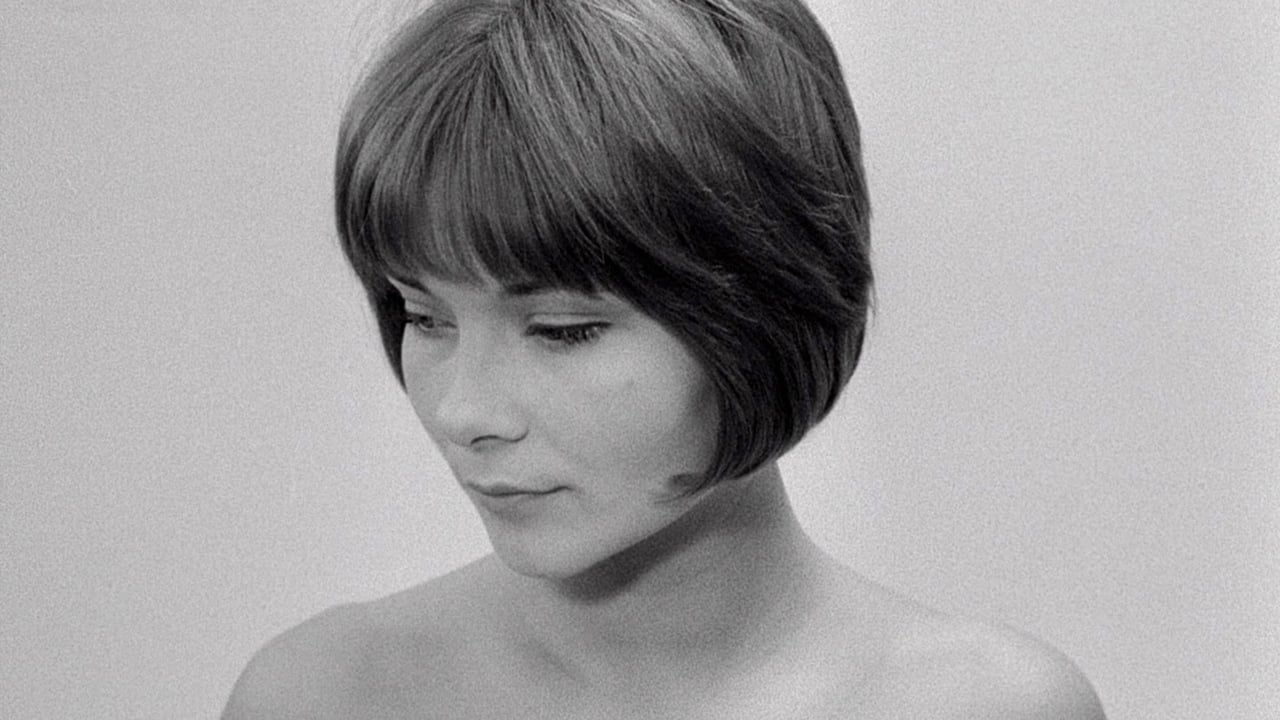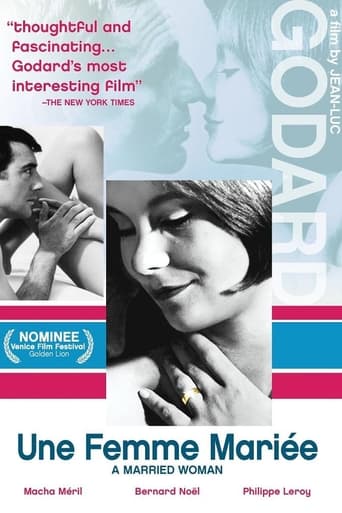

Jean-Luc Godard's eighth feature film, UNE FEMME MARIÉE (A Married Woman, 1964) is a tale of adultery. As it opens, we meet Charlotte (Macha Meril) at a tryst with her lover Robert (Bernard Noël). Though Robert tries to convince her to divorce her husband, the pilot Pierre (Philippe Leroy), Charlotte's loyalties remain divided.Godard labeled UNE FEMME MARIÉE not a "film" but rather "a collection of fragments from a film shot in 1964". However, this is much less avant-garde disjointed than one might expect. Godard chooses a fragment-based means of storytelling for the moments between Charlotte and her lover, presenting a sequence of brief dialogues between the lovers in rapid succession. Each of these self-encapsulated moments serves as another brick in the wall of what we know about the relationship. Such compressed storytelling manages to distill otherwise ineffable interpersonal dramas and feelings. The framing in the scenes between Charlotte and her lover is remarkable: close-up shots of their faces or limbs against featureless backgrounds. Generally the face of the person speaking is not shown and we hear only the words.But while there had already been myriad such tales of love triangles through the ages, this film offers something fresh by combining it with a critique of 1960s consumer society. The characters pepper their conversation with commercial jingles, parrot whole advertising texts, or recite factoids. In shots of home life, the latest fancy name-brand cleaning products and electronics are placed prominently in the frame. Charlotte and her maid read women's magazines and see whether they live up to the standards of beauty that the media prescribes. The Auschwitz trials were going on at the same time as shooting, and Godard chose to work references to this into the characters' conversations. In this way, he underscores how consumer society emphasizes thinking about the present, buying whatever is called must-have now, and thus discourages self-reflection and critically gazing on the past. The film's message remains perennially fresh, and I think many viewers will enjoy UNE FEMME MARIEE.Godard would take up the "housewife and consumerism" theme again three years later in 2 OU 3 CHOSES QUE JE SAIS D'ELLE, where this time the housewife prostitutes herself during the day to buy all the nice things that her husband can't. As a critique of consumerism, that later film is more successful inasmuch as it was shot in colour, and thus shows how commercial brands were using brash designs to draw the eye of shoppers. ("If you can't afford LSD," Godard says in a voice-over there, "buy a colour television.") However, UNE FEMME MARIEE is not just a rough sketch for the later film, and I'd even call it a better film, inasmuch as it tells a coherent story while the elements of the later one don't entirely come together for me.
... View MoreWhat defines us? Or, what defines anything, for that matter? Is it a dictionary definition or our composite understanding that defines? A Married Woman (Une Femme Mariée) is perhaps better understood with reference to its original title, The Married Woman. Our opening scene is merely two lovers. A Man. A Woman. Photographed with immaculate perfection, shorn of erotic or personal overtones, each shot encapsulates the beauty and symmetry of an exquisite fashion ad – say, maybe, Chanel. Only after a few moments do we find out who these two individuals – impeccably framed by Raoul Coutard – are in real life. Assuming they are lovers, yes, but we find that Charlotte is a married woman. Her lover is Robert, an actor.Just as 2 or 3 Things I Know About Her viewed the world through the eyes of commodification, so does Une Femme Mariée view it through the superficiality of advertising. The usual love triangle of a man and two women is turned on its head by giving Charlotte (Macha Méril) two men between whom she cannot choose. Her aspiration to be perfect is measured in terms of messages sent by 60's women's magazines and other media defining the 'ideal woman' – whose main aim, it seems, should be to please her husband. Charlotte measures the position of her breasts, listens to a record on how a woman can improve her marriage (it consists of vacuous female laughter), and is expert at seeming light while keeping both men on the back foot. She sees herself as an object of desire by both Robert and husband Pierre and practices superficiality to perfection. She also, however, seems far from dim-witted when giving either of them a grilling.It is easy to become divided over this film. One can view it as trite, a Godard cast-off, or one can admire the cinematic poetry, the precision with which it delivers its point and its critique of the institution of marriage. It almost goes as far as to suggest that such emptiness is the lot of 'The Married Woman.' (The title was changed at the censor's insistence, who found the definite article disparaging to French women generally. A topless scene was also chopped.) "I love you too, Pierre. Often not the way you believe, but it's sincere." While men's underwear adverts are just plain photos, adverts for women's lingerie are accompanied by unrealistic promises of what they will deliver in a woman's love life (mostly, of course, in terms of a man's pleasure). At one point, Charlotte is standing next to a gigantic brassiere advert, and it is touchingly clear that society made the image more important than the individual.Each of our main characters has a monologue, but we additionally hear Charlotte's internal monologue. When she has had sad thoughts, she repeats to herself, "I'm happy . . . I'm happy . . . I'm happy," as if the mantra will translate into reality. When she learns from the doctor that she is three months' pregnant (to whom?), her internal voice tells her, "Find a solution . . .. Save appearances." She continues to rely quite effectively on the character she has become, now telling each man how much she loves him, all the while skilfully testing him. It is almost as if primitive instinct to secure a hunter-provider takes over. Although Charlotte admits to the doctor she is scared, she doesn't lose her inner composure even once in the whole movie. She might even be shouting, but we can believe it is part of her dexterous womanish wiles – quite ironic, given that she presses Robert to define acting and say exactly how it is different to real life. Only once does she falter, tripping and falling in the road as she leaves the doctor's surgery. When I look back on a film that is almost devoid of real emotion, it is a heart-rending moment.Apart from intertitles, and jump-cuts to juxtapose intertextual media with narrative, other cinematic tricks include switching between positive and negative photographic images and superimposing summaries. Charlotte eavesdrops on two teenagers as they discuss what a man does during the loss of one's virginity. Salient point appear in small grey letters over the image (for instance, "Je dors avec un garçon"), perhaps showing how Charlotte reduces everything to its minimalist formula. For those that find the film itself as empty as the subject matter, one need only to look at the extended references to Racine (in Berenice, where Racine similarly makes something out of nothing for a similarly helpless protagonist), or Moliere, who answered critics by saying that, to prevent sin, theatre purifies love.Perhaps Cahiers critic Jean-Louis Cornolli summed it up best when he described Une Femme Mariée as "a film about a woman's beauty and the ugliness of her world." Macha Méril credits it with striking a blow for women's rights at a time when the pill was still illegal in France.
... View MoreHe did it in 1961, in 1962, in 1963, and in 1964 Godard made another movie about a woman questioning the meaning of love, life, and acting. This movie, like the others, is a fun treat for Godard fans and fans of inventive camera and editing techniques, though it doesn't have as much heart as "Contempt", "Une femme est une femme", or even "Vivre sa vie"."Une femme mariee" depicts the affair of a bored housewife, but director Godard strives to convey the feeling that we are reading about her in a women's magazine. To achieve this the scenes with the actors abruptly cuts to fashion photos, make- up ads, and text. It's a stylish movie with a brisk pace, but, just like a magazine story, it doesn't take long for it to leave the mind or heart either. Yes, Godard's creativity may soar higher here than ever before. His playfulness leaps through the surprising angles and reveals, his panning of words in magazines, x-ray photography, and whispered narration, etc, yet the story seems tacked on. We float from idea to idea as they enter and leave the director's head, which is fun for a one-time viewing, probably the way that glancing at his sketchbook may feel, but the lack of motivation, of purpose, inevitably keeps this effort from standing in the same grouping as the previously mentioned works, the ones that we watch more frequently, the ones that give us cinematic nourishment, the more organic, more well-rounded, fully realized pieces.
... View MoreOne of Godard's least seen films of the sixties,yet one of his most interesting and mature works.At first viewing it seems to be a typically Gallic story of adultery as the married woman of the title,Charlotte (Macha Méril)is torn between her airline pilot husband and her lover,an actor.But in contrast to how Truffaut,for example,treats adultery in the contemporaneous "La Peau Douce",Godard uses it as a pretext to explore the consumer culture of the sixties.He investigates the role which the media plays in forming Charlotte's tastes and opinions,focusing on the endless stream of advertisements,record sleeves,films and magazines to which she is exposed every day and which informs her views on every subject from politics to fashion. Her frequently naked body is seen in close-up,fragmented,com modified like all the other fetishistic images seen throughout the film.As usual with Godard there is a plethora of references to filmic and literary figures who have influenced his work.There are a series of cinéma vérité type interviews with the husband,their son and filmmaker Roger Leenhardt which break up the narrative flow in an acknowledgement to Brecht,who would be a key figure in Godard's development in the next decade,whilst Charlotte indulges in several soliloquies reminiscent of Molly Bloom in "Ulysses",one of his favourite books.Formed by this melding together of disparate elements and techniques,"Une femme marieé" brilliantly expresses what it must have felt for a young woman to be alive in the summer of 1964.
... View More